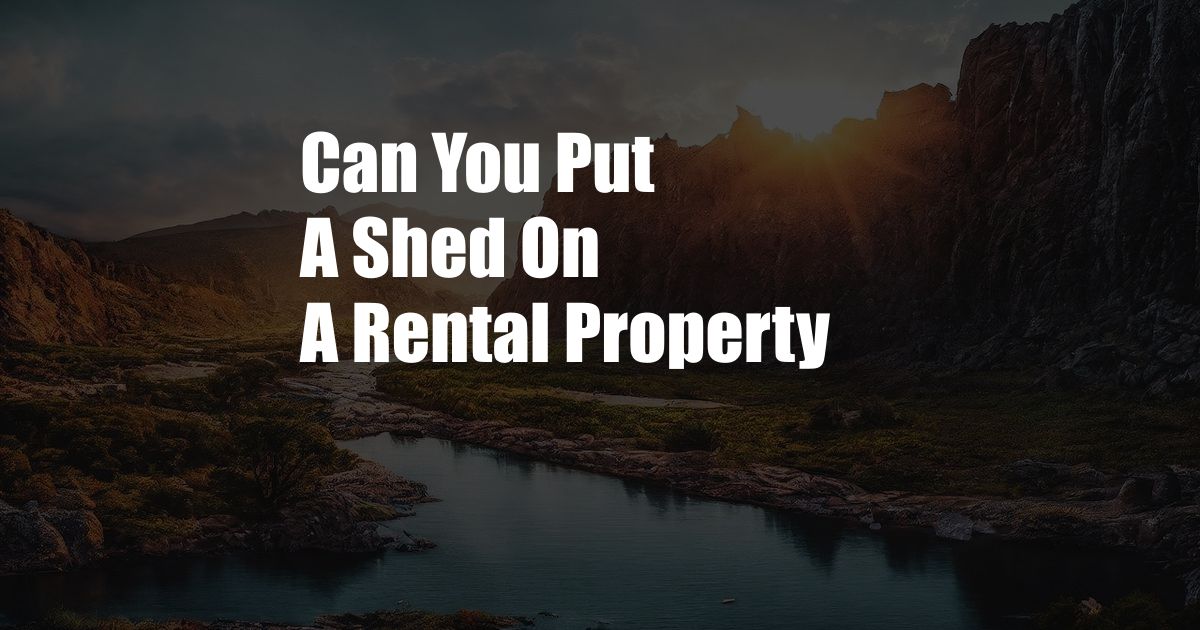
Can You Put a Shed on a Rental Property?
Moving into a new rental property can be exciting, especially if you have outdoor space to enjoy. However, many renters wonder if they can enhance their outdoor area by adding a shed. The answer depends on several factors, including your lease agreement and local regulations.
In this comprehensive guide, we’ll delve into the ins and outs of placing a shed on a rental property. We’ll explore the legal implications, practical considerations, and tips to help you make an informed decision.
Negotiating with Your Landlord
The first step is to carefully review your lease agreement. Many lease agreements prohibit tenants from making any structural changes or additions to the property, including the construction of a shed. If your lease agreement explicitly prohibits sheds, you won’t be able to install one without violating your contract.
However, if your lease agreement is silent on the issue of sheds, you may have some room to negotiate with your landlord. Explain to your landlord that you would like to add a shed to the property and that you are willing to take responsibility for its installation and maintenance. Be prepared to provide details about the size and type of shed you plan to install, and the steps you will take to ensure it does not damage the property.
Understanding Local Regulations
Even if your lease agreement permits the installation of a shed, you must also comply with local zoning and building codes. Contact your local building department to determine if there are any restrictions on the placement or size of sheds in your area. You may need to obtain a permit before constructing a shed, especially if it exceeds a certain size or is located near property lines.
Failing to comply with local regulations can result in fines or even the removal of your shed. Therefore, it is crucial to do your due diligence and ensure that your plans are in accordance with the law.
Types of Sheds and Installation Considerations
There are various types of sheds available, including wooden, metal, and plastic sheds. Each type has its advantages and disadvantages. Wooden sheds are durable and aesthetically pleasing, but they require regular maintenance. Metal sheds are fire-resistant and low-maintenance, but they can be more expensive. Plastic sheds are lightweight and affordable, but they may not be as durable as other types of sheds.
When choosing a shed, consider the size of your outdoor space, the intended use of the shed, and your budget. If you are not handy, you may want to hire a professional to install your shed.
Tips for Shed Installation and Maintenance
If you are permitted to install a shed on your rental property, follow these tips to ensure a successful installation and long-lasting use:
- Choose a level and well-drained location for your shed.
- Prepare the site by removing any grass or vegetation and leveling the ground.
- Follow the manufacturer’s instructions for assembly and installation.
- Secure the shed to the ground using anchors or stakes.
- Regularly inspect your shed for any damage or wear and tear.
- Clean and maintain your shed to extend its lifespan.
FAQs on Sheds on Rental Properties
Q: Can I put a shed on a rental property without permission?
A: No, it is generally not advisable to install a shed on a rental property without the landlord’s permission, as it may violate your lease agreement and local regulations.
Q: What are the consequences of installing a shed without permission?
A: Installing a shed without permission may result in a violation of your lease agreement, fines from the local building department, or even the removal of your shed.
Q: What are the best types of sheds for rental properties?
A: Metal sheds are a good choice for rental properties because they are fire-resistant, low-maintenance, and relatively durable. Plastic sheds are also a good option because they are lightweight and affordable.
Q: Can I use my shed for commercial purposes?
A: It is generally not advisable to use a shed on a rental property for commercial purposes, as it may violate your lease agreement and zoning regulations.
Conclusion
Whether or not you can put a shed on a rental property depends on several factors, including your lease agreement, local regulations, and the type of shed you want to install. It is crucial to carefully consider these factors and obtain necessary permissions before proceeding with installation. By following the tips and advice outlined in this article, you can successfully navigate the process and enjoy the benefits of a well-placed shed on your rental property.
Are you interested in more information on shed installation and maintenance? Leave a comment below, and I’ll be happy to provide additional insights.